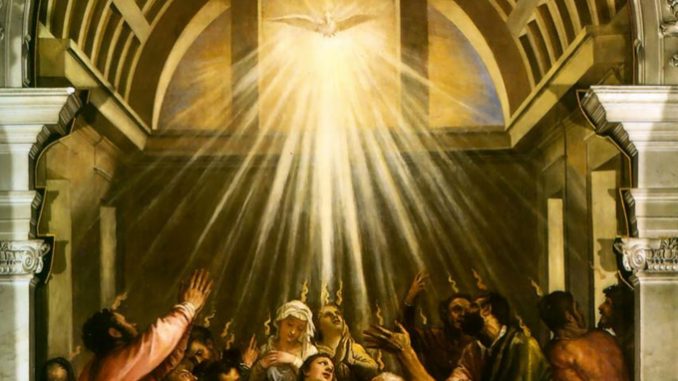
Pentecost Sunday is one of the feasts of the liturgical year that surprises us with an extra song before the Gospel at Holy Mass. Just when we are ready to launch (or heave, or slowly straighten) ourselves out of our pews for the Alleluia, the musicians seem to get confused and start singing a hymn. And so, we sit a bit longer, puzzled but hopefully also noticing the rich meaning of the words being sung.
The musicians are not confused. The “extra” song is a part of the Church’s Sacred Liturgy, meant to emphasize the special importance of certain feasts days. The words of the Pentecost sequence are as follows:
Come, Holy Spirit, come!
And from your celestial home
Shed a ray of light divine!
Come, Father of the poor!
Come, source of all our store!
Come, within our bosoms shine.
You, of comforters the best;
You, the soul’s most welcome guest;
Sweet refreshment here below;
In our labor, rest most sweet;
Grateful coolness in the heat;
Solace in the midst of woe.
O most blessed Light divine,
Shine within these hearts of yours,
And our inmost being fill!
Where you are not, we have naught,
Nothing good in deed or thought,
Nothing free from taint of ill.
Heal our wounds, our strength renew;
On our dryness pour your dew;
Wash the stains of guilt away:
Bend the stubborn heart and will;
Melt the frozen, warm the chill;
Guide the steps that go astray.
On the faithful, who adore
And confess you, evermore
In your sevenfold gift descend;
Give them virtue’s sure reward;
Give them your salvation, Lord;
Give them joys that never end. Amen.
Alleluia.
This hymn, which is around 800 years old, offers a beautiful poetic picture of the Holy Spirit at work in our lives. But now, we will move quickly from the sublimity of ancient liturgical texts to a more contemporary culture reference in order to understand our faith in the Holy Spirit more deeply.
There is a scene in the original Star Wars movie in which Luke Skywalker has just met Han Solo and is shown to the hangar where Solo’s ship, the Millennium Falcon, is docked. Luke, who needs a fast and able ship in order to elude the fleet of the evil Empire, looks the Millennium Falcon over and, noticing its age and pretty obvious wear-and-tear, refers to her with some disbelief as “that hunk of junk.” Han Solo, ever touchy about his favorite ship, replies defensively, “She’s got it where it counts, kid.”
It is good to consider what it means for a Catholic disciple to “have it where it counts,” and it is unsurprising to find that it has a lot to do with the Holy Spirit.
One of the great blessings of the priesthood is to hear people’s confessions and to offer them God’s forgiveness. Of course, people come to confession with all kinds of sins and problems. And while God is always happy to forgive our sins, people still leave confession with many of the same problems as they had when they walked in: bad health, challenging marriages and family situations, persistent temptations to sin, and so forth.
Going back to the Millennium Falcon image, to the eye of someone without faith, people can look pretty “junky” both coming into and going out of the confessional. So what difference does confession make?
The difference is that when a person has received God’s forgiveness, that person can be sure that he’s “got it where it counts.” The most important line in the Formula of Absolution is obviously, “I absolve you from your sins,” but the rest of the formula is also extremely significant:
God, the Father of mercies,
through the death and the resurrection of his Son
has reconciled the world to himself
and sent the Holy Spirit among us
for the forgiveness of sins;
through the ministry of the Church
may God give you pardon and peace,
and I absolve you from your sins
in the name of the Father, and of the Son, +
and of the Holy Spirit. (Amen.)
The Formula of Absolution tells us that the Holy Spirit has been sent “for the forgiveness of sins,” and it includes a prayer that “God give you pardon and peace” through the sacrament. In the Profession of Faith the Church offers every Sunday, the Holy Spirit is identified as the “Lord and Giver of Life.” So the Holy Spirit does no less than to bring the dead back to life, to make sure we’ve “got it where it counts”.
So what does it mean to have it where it counts? It means that however challenging a person’s life may be on the outside, God dwells within, and any person in whom God dwells is alive and well in the most important way possible. The Holy Spirit is truly and fully God, so to have the indwelling of the Holy Spirit is to have God within.
The Spirit first comes to live within us at Baptism, and we receive a fuller outpouring of the Spirit at Confirmation. It is easy to neglect thinking about these sacraments, because we received them at infancy and during adolescence, the latter being a time when many of us were not at our spiritual best. Yet Baptism is the reason we became spiritually alive in the first place, and Confirmation was for us what we celebrate on this great feast—our own personal Pentecost. In other words, the Holy Spirit has come upon each of us just as powerfully as He came upon our Blessed Mother and the apostles on the first Pentecost.
Our bodies have become temples of the Holy Spirit, the dwelling place of God. All of us who are sacramentally initiated into the Church have been made so good and pure that the all-perfect God can live in us and be pleased to do so. And even when we sin, confession heals us so that we can become holy temples of the Spirit once again.
And what difference does it make for us when we have the Holy Spirit? It is essential that we understand the transformation from death to life the Spirit makes possible for us. On the one hand, if we don’t understand the “death” from which we have been delivered, we end up taking God’s gifts—and even God Himself!—for granted. We come to think it is perfectly natural that God should love and want to live in people as wonderful and charming as we are. On the other hand, if we do not appreciate the “life” we have received as a gift from God, we despair, thinking only of death and darkness, of human misery and tragedy. We need to see the whole journey in order to understand what God is doing in our lives.
St. Paul teaches in Romans 8:11, “If the Spirit of the one who raised Jesus from the dead dwells in you, the one who raised Christ from the dead will give life to your mortal bodies also, through his Spirit that dwells in you.” And we see in the Gospels and the Acts of the Apostles that the Holy Spirit is critical to the new life the apostles lead. Their transformation is nothing short of an experience of spiritual death and resurrection: death, in their infidelity to Our Lord; resurrection, in the new life they so clearly live as evangelists, apostles, and finally martyrs.
Catholics today frequently pray for a “new Pentecost,” a fresh outpouring of the Holy Spirit. Especially in the context of the New Evangelization, the prayer of these disciples is that the Spirit that would empower them to do just what the apostles did. They wish to imitate the apostles by sharing Jesus Christ with the people of our time in a way that is bold, loving, and effective in leading them to enjoy the riches of our Catholic faith.
So, what does this mean for our lives? What do we need to do in order to keep moving away from the death of sin and into the life of God? What do we need to do in order to begin doing the work of the apostles in sharing our faith? Here are four steps all of us can take right now to increase our life in the Holy Spirit:
-
- Desire it. This sounds obvious, but this first stage is often overlooked. We should hunger and thirst for God, but often we allow the Holy Spirit to become dormant in us through our disinterest or apathy. We easily lapse into treating our work, our hobbies, or even our smart phones as if they were much more important to us than our relationship with God.
-
- Pray for it. Again, praying is a pretty obvious suggestion, but how often do we actually ask for a greater outpouring of the Holy Spirit? Jesus tells us our Father will give us the Holy Spirit if we ask in His name.
-
- Surrender to the Spirit. Be careful what you wish for! To ask for the Holy Spirit is to ask God to take control of your life. We must yield to the Spirit’s influence. God will not force us. Say “yes” to God!
-
- Follow-through. We have to live this new life, energetically, as disciples of Jesus. Our lives must be different because of our faith, and we must be purposeful about living in this different way every day of our earthly lives.
To have the Holy Spirit within us is to “have it where it counts,” and this is what we celebrate on this feast of Pentecost. May the Body and Blood of Jesus strengthen us so that we might be ready to receive a new outpouring of the Holy Spirit and live according to the Spirit’s direction, living the only life truly worthy of the name, and sharing the goodness of this life with every person we meet.
If you value the news and views Catholic World Report provides, please consider donating to support our efforts. Your contribution will help us continue to make CWR available to all readers worldwide for free, without a subscription. Thank you for your generosity!
Click here for more information on donating to CWR. Click here to sign up for our newsletter.







“Surrender to the Holy Spirit: Be careful what you wish for!” The Holy Spirit is not an angel bringing divine gifts. I looked up the definition of spirit: “the non-physical part of a person which is the seat of emotions and character; the soul. The deepest reality of a person, the individual depth of a person1 The Holy Spirit dwells in the deepest existence and reality of the Most High, the source and origin, the core and glory of the Divine Godhead; the divine love that unites the three divine Persons dwells in the “heart” of the Eternal Father. The Divine Love proceeds from the Father to the Son, the Divine Love, the Holy Spirit is the personified love of God. That is why Jesus declares: Who blasphemes against the Holy Spirit will not be forgiven! God is Love. To be partakers of the innermost holiness of God Almighty, we have to be abiding in Him, the Son of God who redeemed us and abides in us. Oh, come Holy Spirit, set us on fire!
Thank you ; mentioning again about the good little book below , on Holy Spirit , that can help believers to know that the ‘cleansing ‘ that The Spirit is called to do can involve aspects that may not be quite all in line with the expectation of quick fix of all joy and peace , in our cultural programming for immediate gratifications –
https://www.ignatius.com/The-Holy-Spirit-Fire-of-Divine-Love-P1110.aspx